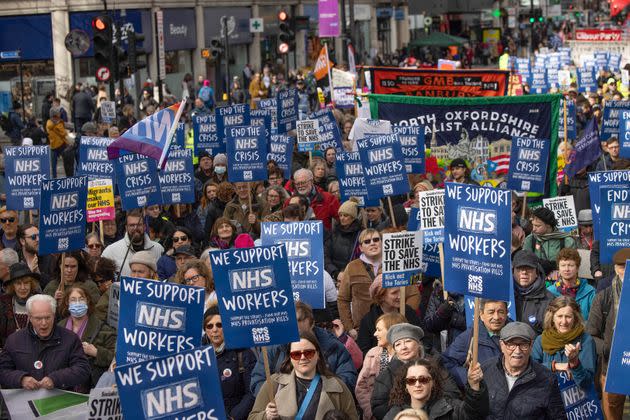The United Kingdom celebrated this Wednesday the 75th anniversary of the creation of the NHS, the National Health Service. But the first public health system in the world is going through a deep crisis.
The King and Queen of England and politicians joined the many celebrations on Wednesday to mark the 75th anniversary of the NHS.
Funded by taxes and national insurance contributions, the NHS remains popular with the British. But it might not survive its 100th birthday without a radical change in its budget and a major increase in the number of its dedicated staff.
The National Health Service was founded three years after the Second World War by a Labor government on the principle that everyone should have access to high quality tax-funded health care provided free of charge.
Prime Minister Rishi Sunak, whose parents were doctors and pharmacists in the NHS, paid tribute to this institution last week by presenting a 15-year plan to recruit hundreds of thousands of new health personnel.
“For every minute of every day for these 75 years, the NHS has been kept going by the millions of people who have worked for it. On behalf of a grateful nation, I want to say to them: thank you,” he said. -he declares.
Like the Prime Minister’s parents, immigrant staff played a vital role in the early growth of the NHS, helping to reshape the face of the UK in the decades following the war.
Repeated strikes
But the government’s new recruitment plan is under unprecedented pressure in the wake of the pandemic even though 12% of the UK budget is spent on health care, by far the country’s largest single item of expenditure.
Demoralized, doctors and nurses have multiplied strikes in recent months to obtain better salaries in the face of an aging population and the lack of resources of the public health system.
Sumi Manirajan, deputy chair of the British Medical Association’s Young Doctors Committee, accused the Conservative government of not valuing doctors enough.
“Doctors are leaving the country, going overseas, to Australia, New Zealand, Canada, and the public is the loser.”
“The government (ministers) can use private healthcare, but the ordinary citizen in the UK uses the NHS, relies on the NHS.”
In a report to mark the 75th anniversary, the charity King’s Fund compared the healthcare systems of 19 similar countries and found that the UK’s was in critical condition.
The NGO cites data showing the UK is the worst performer in terms of death rates for strokes and the second worst for heart attacks.
The country has “a surprisingly low number of nurses and doctors per person compared to its peers” and four times fewer hospital and intensive care beds than Germany, according to the report.
Opinion polls also show that the British are not in favor of radical reform such as the move to a mixed funding model, where patients would pay for part of their treatment through insurance, as is the norm elsewhere.
According to last year’s annual British Social Attitudes Survey, 93% of more than 3,000 respondents believe the NHS should remain free at the time of care, based on general tax.
The NHS is failing
But the authoritative survey also found that a record 51% of those polled were unhappy with the quality of care, particularly waiting times for a doctor’s appointment. general practitioner or hospital doctor.
The Prime Minister has resisted pay demands for doctors as he struggles to rein in Britain’s runaway inflation, while insisting his government is investing “record sums” in the NHS.
But the service needs to be modernized through better use of digital technology, including artificial intelligence, he said on Friday.
Mr Sunak has claimed his workforce plan will ensure the NHS is ready “for decades to come”. But some on the front line have a much bleaker prognosis.
“At present, as a functional and universal public service, the NHS is failing,” wrote geriatrics consultant David Oliver in the medical journal The BMJ.
He warned: “He may not be quite at the end of his life, nor about to have his financial or political support withdrawn, but without immediate action and longer-term thinking, he will not reach his 85th birthday.
This article is originally published on fr.euronews.com

